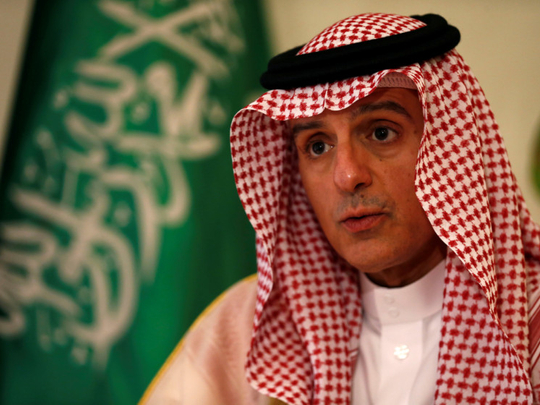
Riyadh: Saudi Arabia’s Foreign Minister Adel Al Jubeir said on Thursday the kingdom’s actions in the Middle East were a response to what he called the “aggression” of Iran.
Riyadh and Tehran are waging a contest for power on several fronts across the region, notably in Yemen and Lebanon.
“Any way you look at it, they (the Iranians) are the ones who are acting in an aggressive manner. We are reacting to that aggression and saying, ‘Enough is enough. We’re not going to let you do this anymore’”, Al Jubeir told Reuters in an interview.
An Iranian ally
He said Saudi Arabia was consulting its allies about what leverage to use against the Lebanese militant group Hezbollah—an Iranian ally—to end its dominance in the small Mediterranean nation and intervention in other countries.
“We will make the decision when the time comes,” he said.
Al Jubeir said Hezbollah, which he described as a subsidiary of Iran’s Revolutionary Guard, must disarm and become a political party for Lebanon to stabilise.
“Whenever we see a problem, we see Hezbollah act as an arm or agent of Iran and this has to come to an end,” he said after meeting his French counterpart in Riyadh.
Sa’ad Hariri, a Saudi ally, resigned as Lebanon’s prime minister on Nov. 4, citing an assassination plot and accusing Iran and Hezbollah of sowing strife in the region.
Free to leave
The Saudi foreign minister said Hariri was free to leave at any time—refuting once again rumours he is being held against his will.
A source close to Hariri told Reuters he was expected to leave Riyadh with his family for Paris in the next 48 hours, before travelling on to Beirut.
On his part, Lebanese President Michel Aoun said: “We hope the crisis is over and the door of solution is opened by Hariri’s acceptance of the invitation to visit France.”
Mewanwhile on the topic of Yemen, Al Jubeir accused the Iran-aligned Al Houthis of besieging civilian areas and preventing supplies from coming in or out.
“That’s why you have the starvation that’s taking place in Yemen and people need to do a more serious job of holding Al Houthis accountable for this,” he said.












